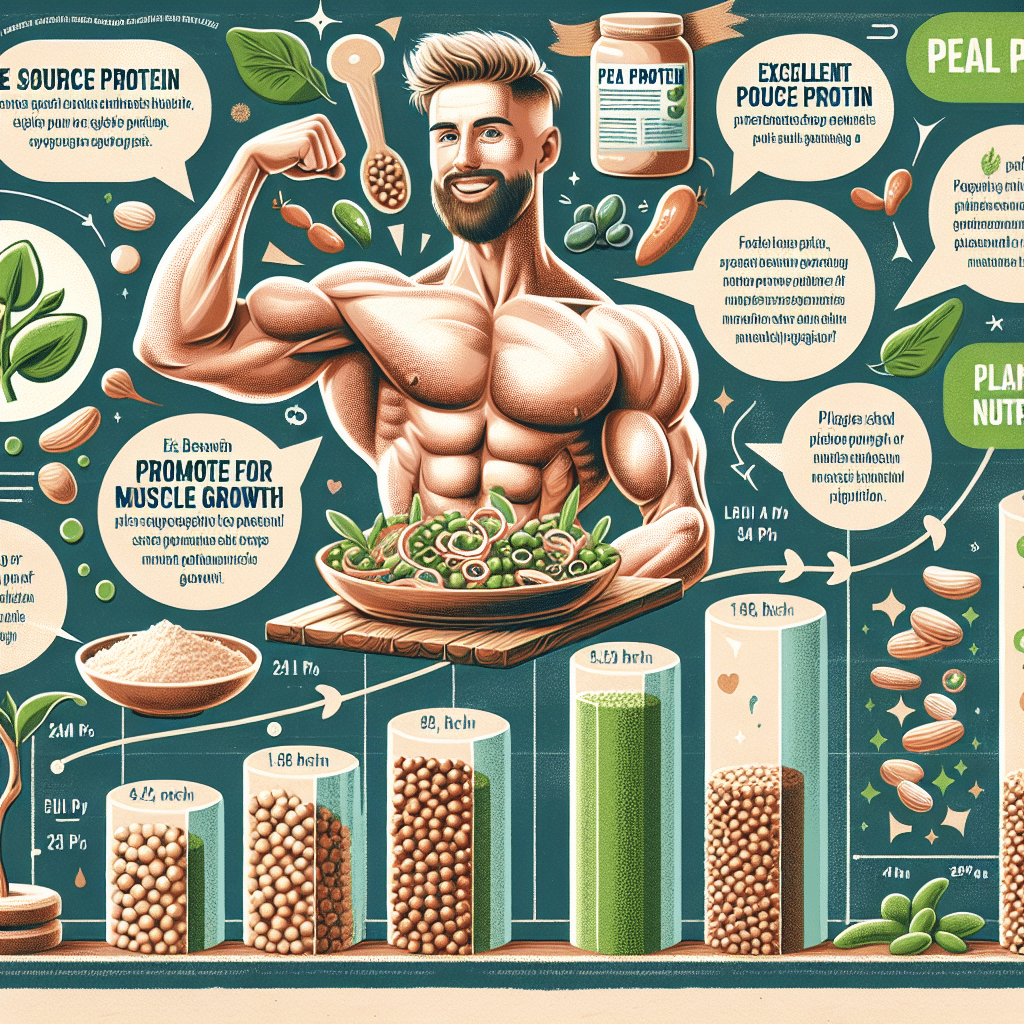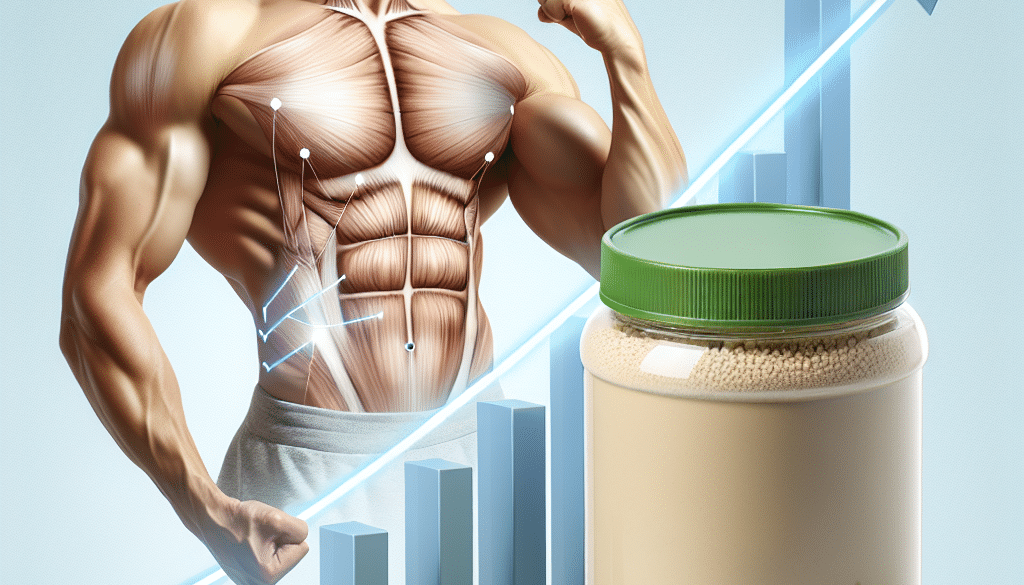Does Pea Protein Promote Muscle Growth?
-
Table of Contents
- Pea Protein and Muscle Growth: An In-Depth Analysis
- Understanding Pea Protein
- The Role of Protein in Muscle Growth
- Scientific Evidence on Pea Protein and Muscle Growth
- Comparing Pea Protein to Other Protein Sources
- Optimizing Muscle Growth with Pea Protein
- Case Studies and Anecdotal Evidence
- Conclusion: Pea Protein as a Viable Muscle-Building Supplement
- Discover ETprotein’s Premium Pea Protein Products
Pea Protein and Muscle Growth: An In-Depth Analysis

As the quest for sustainable and plant-based dietary options continues to grow, pea protein has emerged as a popular alternative to traditional animal-based proteins. With the rise of veganism, vegetarianism, and flexitarian diets, many fitness enthusiasts and athletes are turning to pea protein to support their muscle-building goals. But does pea protein truly promote muscle growth? This article delves into the science behind pea protein and its efficacy in muscle synthesis.
Understanding Pea Protein
Pea protein is derived from yellow split peas and is a high-quality alternative to dairy and meat-based proteins. It is rich in essential amino acids, particularly branched-chain amino acids (BCAAs) like leucine, isoleucine, and valine, which are crucial for muscle protein synthesis. Unlike some plant proteins, pea protein is also hypoallergenic and easily digestible, making it a suitable option for individuals with dietary restrictions.
The Role of Protein in Muscle Growth
Protein is a vital macronutrient necessary for the repair and growth of muscle tissue. After a workout, muscles undergo repair and growth through a process called muscle protein synthesis (MPS). For MPS to occur, the body requires a sufficient supply of amino acids, which are the building blocks of protein. The presence of all essential amino acids, especially BCAAs, is critical for this process.
Scientific Evidence on Pea Protein and Muscle Growth
Several studies have investigated the impact of pea protein on muscle growth, comparing it to other protein sources like whey. A 2015 study published in the Journal of the International Society of Sports Nutrition found that pea protein supplementation led to similar gains in muscle thickness as whey protein in participants involved in a 12-week resistance training program. This suggests that pea protein can be just as effective as whey protein in promoting muscle growth when consumed in adequate amounts.
Comparing Pea Protein to Other Protein Sources
When it comes to muscle growth, the quality of protein is measured by its amino acid profile and digestibility. Pea protein contains all nine essential amino acids, although it is slightly lower in methionine compared to animal proteins. However, when combined with other plant-based proteins that are rich in methionine, such as rice protein, it can provide a complete amino acid profile.
- Whey Protein: Known for its rapid absorption and high BCAA content, whey protein is often considered the gold standard for muscle growth. However, it is derived from milk and not suitable for those with lactose intolerance or dairy allergies.
- Soy Protein: Soy protein is another complete plant-based protein with a good BCAA profile. However, some individuals may prefer to avoid soy due to allergies or concerns over phytoestrogens.
- Pea Protein: With its high BCAA content, particularly leucine, pea protein is a strong contender for supporting muscle growth. It is also environmentally friendly and suitable for most dietary needs.
Optimizing Muscle Growth with Pea Protein
To maximize muscle growth with pea protein, it is important to consume an adequate amount of protein in conjunction with a well-structured resistance training program. The timing of protein intake can also play a role, with many experts recommending protein consumption within a window of 30 minutes to two hours after exercise to support MPS.
Case Studies and Anecdotal Evidence
While scientific studies provide valuable insights, anecdotal evidence from athletes and bodybuilders who have successfully incorporated pea protein into their diets also supports its effectiveness. Many report positive results in terms of muscle gain, recovery, and overall performance.
Conclusion: Pea Protein as a Viable Muscle-Building Supplement
In conclusion, pea protein has been shown to promote muscle growth effectively, especially when consumed in the right amounts and combined with resistance training. Its high BCAA content, digestibility, and hypoallergenic properties make it an excellent choice for those looking to build muscle on a plant-based diet. As research continues to evolve, pea protein is likely to become an even more prominent player in the sports nutrition field.
Discover ETprotein’s Premium Pea Protein Products
If you’re looking to incorporate high-quality pea protein into your diet, ETprotein offers a range of organic and non-GMO pea protein products that cater to your muscle-building needs. Their pea protein is characterized by a neutral taste and allergen-free attributes, ensuring that you can enjoy the benefits of this plant-based protein without compromising on flavor or quality.
ETprotein’s commitment to excellence is evident in their extensive product range, which serves various industries, including sports nutrition and health and wellness. By choosing ETprotein, you’re not only supporting your fitness goals but also opting for a sustainable and ethical protein source.
About ETprotein:
ETprotein, a reputable protein and L-(+)-Ergothioneine (EGT) Chinese factory manufacturer and supplier, is renowned for producing, stocking, exporting, and delivering the highest quality organic bulk vegan proteins and L-(+)-Ergothioneine. They include Organic rice protein, clear rice protein, pea protein, clear pea protein, watermelon seed protein, pumpkin seed protein, sunflower seed protein, mung bean protein, peanut protein, and L-(+)-Ergothioneine EGT Pharmaceutical grade, L-(+)-Ergothioneine EGT food grade, L-(+)-Ergothioneine EGT cosmetic grade, L-(+)-Ergothioneine EGT reference grade and L-(+)-Ergothioneine EGT standard. Their offerings, characterized by a neutral taste, non-GMO, allergen-free attributes, with L-(+)-Ergothioneine purity over 98%, 99%, cater to a diverse range of industries. They serve nutraceutical, pharmaceutical, cosmeceutical, veterinary, as well as food and beverage finished product distributors, traders, and manufacturers across Europe, USA, Canada, Australia, Thailand, Japan, Korea, Brazil, and Chile, among others.
ETprotein specialization includes exporting and delivering tailor-made protein powder and finished nutritional supplements. Their extensive product range covers sectors like Food and Beverage, Sports Nutrition, Weight Management, Dietary Supplements, Health and Wellness Products, and Infant Formula, ensuring comprehensive solutions to meet all your protein needs.
As a trusted company by leading global food and beverage brands and Fortune 500 companies, ETprotein reinforces China’s reputation in the global arena. For more information or to sample their products, please contact them and email sales(at)ETprotein.com today.












